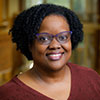- Website: The Innovative Library Classroom
- 2022 Conference: Schedule | Full Program
Coming into the 2021 – 2022 academic year, when I started thinking about “Where shall I go for professional development? Which conferences do I want to present at?”, I was torn between in-person and online conferences. To be completely transparent, my reactions to the 2nd vaccination shot and the booster were not ideal. Also, having a friend pass away from COVID in February transformed me from “relax about anything” to Howie Mandel OCD level. Therefore, I searched for a conference that would be small in scale to dip my toes back into the in-person conference waters.
Since my presentation proposal “Analyzing the Scholarly Conversation: New Tools for Efficiently Finding, Evaluating, and Visualizing Research” was accepted, I headed to the Innovative Library Classroom conference in Williamsburg, Virginia at William and Mary. We have to talk about the unintended deviation to Wilmington offline. NOTE TO SELF: Make sure that you are headed in the right direction before talking to your mother for an hour and to another friend for an hour.
If you teach a for-credit information literacy course or a one-shot, you want to go to Innovative Library Classroom conference. It doesn’t matter if you are novice instructor fresh out of graduate school with your MLIS degree or a seasoned instructor having taught for years or even decades, every presentation I went to I learned new techniques and new perspectives. I uncovered different things I want to integrate into my one-shots as well as ways I want to modify LIB290: Information Literacy for Engineering. I’ve included the sessions I attended below and highlights from each. Enjoy!
Kathia Ibacache & Elizabeth Novosel University of Colorado Boulder “Finding Underrepresented Voices: Using Social Media as an Information Source in IL Instruction”
Kathia and Elizabeth emphasized the importance of hashtags and learning how to utilize them to search different social media platforms. One thing that lingered in the back of my mind that they clearly communicated is the fact that jargon has changed over time. In searching using keywords rather than controlled vocabulary, you may be searching and finding current information simply because you’re using current terminology. For example, queer is one term that you’re not going to find in research in the context intended. Looking at the etymology of the word queer uncovers the fact that queer studies defined as homosexual didn’t enter as an academic discipline until 1994. Historically, the origins of the word queer rest in the definition “strange, peculiar, odd, eccentric”
Another question and idea posed was
- How can I use social media in my own instruction to get varied voices and opinions?
- Look at tweets as an example of a primary source or secondary sources as well as trace tweets to illustrate forward and backwards citation searching
Deborah Bauder, State University of New York at Oswego “Supporting First-Gens in the Library Classroom: A Case Study in Improved Connections”
This presentation right here literally blew my proverbial socks off! The work that Deborah is doing to ensure that first generation (first-gen) students can navigate the complicated and complex halls of academia is amazing!!! First off, yes, I asked Deborah for her slides from the conference and she took it ten steps further by providing her instruction notes, the slides, and a link to the first-gen research guide developed for first-gen students to help them learning the vernacular used in academia, what resources are available to them, etc. etc. etc. She graciously even said that I could share them. Feel free to check out Deborah’s work here.
Candice Benjes-Small William & Mary “Beyond selfcare: a call for sustainable practices in library instruction”
This is the presentation that had me realizing how good I have it hear at ZSR Library. Candice did an excellent job illustrating and illuminating the various ways and areas where burnout occurs for librarians. Her list of resources/references is impeccable. However, it was the small group discussions at my table that almost had me on the floor. When one librarian reflected that she was told to teach 16 one-shots in two days in her first job, my jaw dropped. When she stated that she repeated this herculean feat AGAIN the next month, I have to confess that I said “Aw heck naw!” I went back to look at my one-shot statistics. The maximum number of one-shots I delivered in an entire SEMESTER was ELEVEN!!! ELEVEN people!!!! I remember teaching just 2 3 hour one-shots back-to-back for EGR212 in Spring 2020. I felt that pain of standing (even though I wasn’t standing for all six hours) even in tennis shoes. I thought I was prepared, but I was exhausted mentally and physically just from two one shots in one day. I don’t know what is happening out there in the library world, but just say no to drugs!!!!!

7 Comments on ‘The Innovative Library Classroom (Thursday, June 2 and Friday, June 3, 2022)’
Denice, thanks for this thoughtful reflective post on TILC! It’s one of my favorite conferences, and I’m sorry I missed it this year! After reading your post, I’m adding it to my list for next year!
I’ll roll out with you Hu!!!!
Thanks for this great post, Denice! I did not know that TILC had moved to W&M–so glad to know this is still happening.
Thanks for sharing this, Denice! Sounds like an awesome conference with lots of insights.
Thanks for sharing your experiences at an “in person” conference. I appreciate your insights and also the care with which you sought out a conference that would meet your needs! Well done!
Glad to hear you had an engaging TILC experience!
I was interested in the solutions you found for the paper that was not in WoS. Also that anonymous pre-instruction survey is such a simple tool, but could completely shift how a one-shot is delivered!